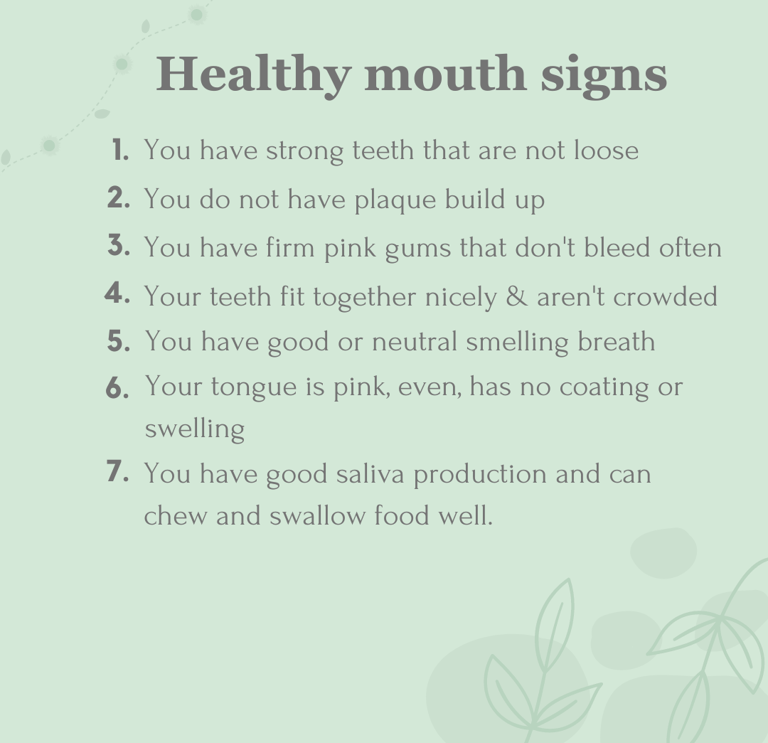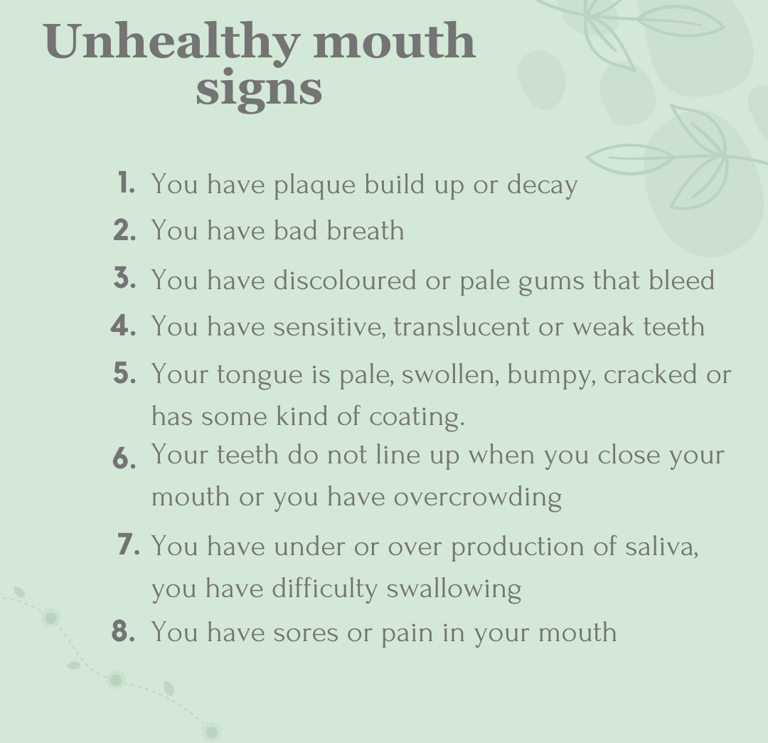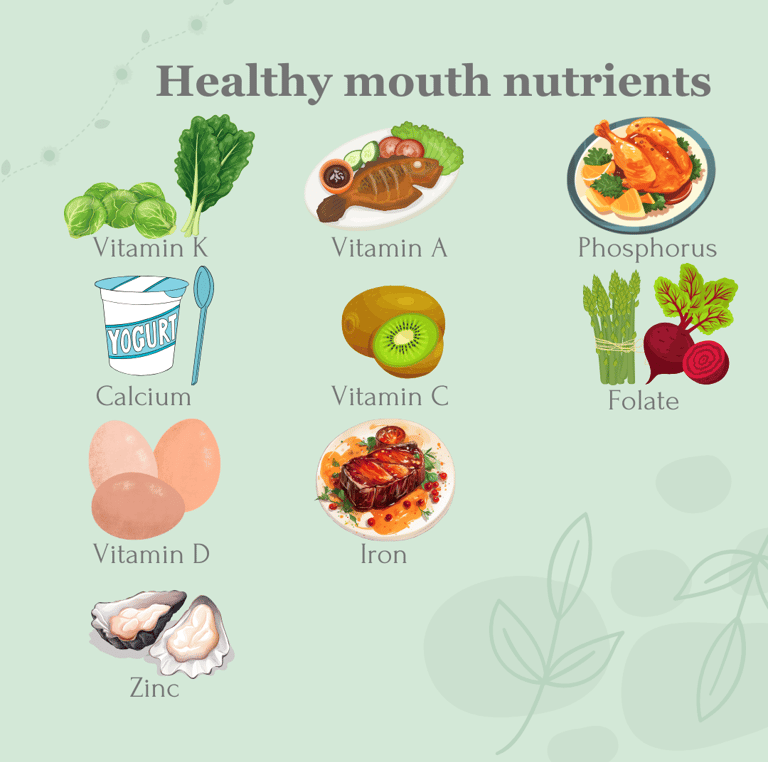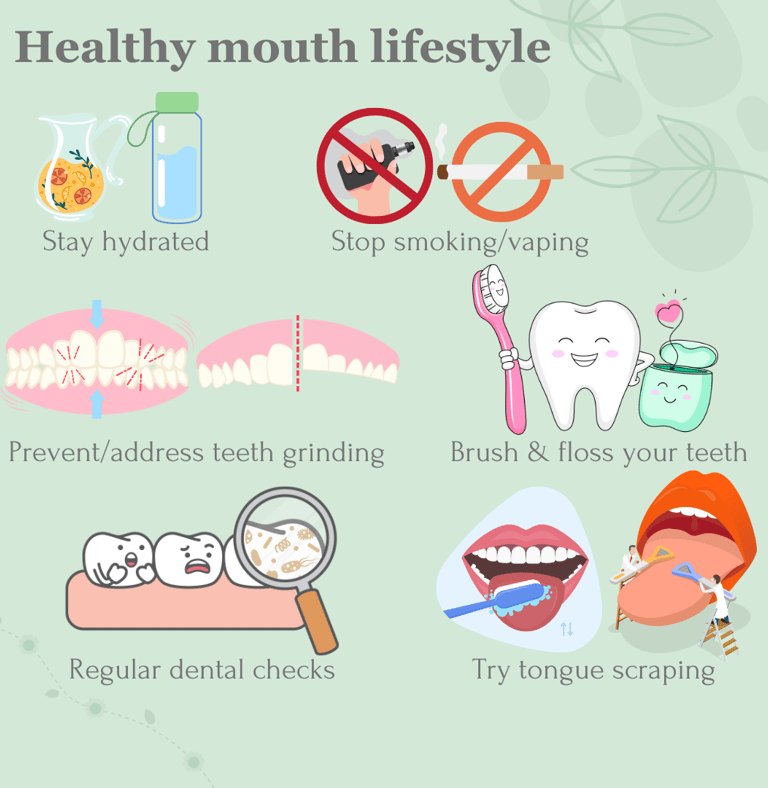

What is the Mouth?
The mouth is made up of the lower jaw (mandible), upper jaw (maxilla) and contains the teeth, tongue, gums, lips, salivary glands, hard and soft palate. The mouth and its components have many important functions including being the first step in digestion, a role respiration and has an important role in communicating.
The main roles of the mouth are chewing food, intaking water and communication. The mouth does have a role in respiration by being able to take in air and deliver this air to the lungs. The mouth can deliver a large amount of air to the lungs but this air is unfiltered air and prolonged mouth breathing is not optimal, as we explored in the nasal health post and we will look at later.
Digestion begins in the mouth with food being ground up into smaller pieces by the teeth and the salivary glands producing two enzymes, salivary amylase and lingual lipase, to help begin the process of breaking down carbohydrates and fats and soften the food by adding moisture, making it easier to swallow.
Mouth signs and symptoms




Mouth signs and symptoms can indicate that the oral cavity may not be at its healthiest. Not all oral symptoms point to something severe, however, all symptoms or signs should be investigated to have conditions ruled out if they are ongoing. If you have any signs or symptoms you are concerned about, please have these investigated by a doctor or dentist.
Some symptoms related to the mouth include:
Loose teeth
Red, sore gums
Swollen gums
Sore or sensitive teeth
Discoloured teeth
Plaque build up on the teeth
Ongoing bad breath or sweet smelling breath
Pale or discoloured gums
Chronic bleeding gums
Swollen or discoloured tongue
Chronically coated tongue
Dry mouth
Hypersalivation
Mouth Ulcers - particularly if chronic
Difficulty with chewing or swallowing
Mouth pain
Restricted tongue movement
Mouth diseases and disorders
Conditions and disorders of the mouth can lead to a whole host of other issues due to the importance of calories and nutrient intake via the mouth. Not all of the following disease and disorders affect only the mouth and many are impacted by other factors other than just the mouth. Some symptoms that impact the mouth are caused by diseases and disorders that involve other body systems.
Impacted wisdom teeth
Oral Candida
Gingivitis
Cavities and dental plaque
Cleft palate/lip
Cold sores
Dysphagia
Halitosis
Tongue Ties
Mouth ulcers
Xerostomia
Oral cancers
Oral injuries
HPV
Lichen Planus
Teeth grinding
Nutrition for mouth health


Nutrition can play an important role in optimizing oral health and supporting oral function, as well as aiding in symptom management or improvement in some oral conditions. The nutrients and food listed here is general advice for supporting oral health. It is always best practice to include wholefood sources of these foods over supplements. Wholefood sources often have other nutrients that aid in absorption or benefit the recommended nutrients. Supplements should only be taken under the guidance of a qualified health professional. If you have a specific symptom or condition you would like help with. Please consult a qualified health professional. If you would like to see if I can help you, please either book a discovery call or email me.
Vitamin K: Vitamin K2 plays an important role in bone and teeth health. Vitamin K2 activates a molecule called osteocalcin and matrix-GLA protein which is needed to carry calcium into the bones and teeth. This is an important molecule in the teeth as it can help remineralize teeth and prevent cavities from forming. If you needed another reason to boost your intake of vitamin K2, the matrix-GLA protein (which needs vitamin K2), helps to collect calcium from blood vessels and transport them into the teeth and bones, helping to prevent calcium plaque deposits in blood vessels! Vitamin K2 is a fat soluble vitamin so should be consumed with a good source of fat in order to aid absorption, luckily, the most of the naturally occuring food sources of vitamin K2 also have a good source of fat to aid in absorption. Vitamin K is also synthesised by bacteria in the gastrointestinal tract.
Food sources: Natto, Beef Liver, Cheese, Butter, Chicken, Sauerkraut, and Eggs (specifically the yolk).
Vitamin A: Vitamin A is another fat soluble vitamin. It is vital for healthy mucus membranes and can act as a mucus membrane conditioner, this is obviously highly important for oral health as the mouth is lined with a mucous membrane known as the oral mucosa. Deficiency has been associated with gum inflammation and infection, impaired tooth formation, dry mouth and increased risk of cavities. Animal sources of vitamin A are often more bioavailble than plant sources of vitamin A which needs to be converted in the body to a readily absorbed form, only 5% to 65% of plant sources of vitamin A are converted into a source of vitamin A the body can use.
Food sources: Beef Liver, Sweet Potato, Carrots, Lamb Liver, Cod Liver Oil, Salmon, Butter, Eggs and Whole Milk.
Phosphorus: When we think of healthy bones and teeth, we usually think of calcium, however, phosphorus also plays are really important role here! Up to 85% of phosphorus in the body is found in the bones and teeth. Phosphorus actually helps to mineralize teeth (the enamel and dentin) and bones. It is important in both the formation of teeth and bones and also their maintenance, so it is not just something we need to focus on children getting enough of but also adults! Phosphorus actually works together with calcium and vitamin D to help keep our bones and teeth healthy.
Food sources: Yoghurt, Milk, Salmon, Chicken, Turkey, Liver, Brazil Nuts, Cashews, Potatoes.
Calcium: Calcium is probably the more common mineral when you think of healthy bones and teeth, and its because it is very important for strong healthy teeth and also our jaw bones. Similar to the role of phosphorus, it helps to mineralize teeth and bones. Calcium is supported by phosphorus and vitamin D in order to best strengthen and support jaw bone and teeth health.
Food sources: Yoghurt, Cheese, Sardines, Milk, Tofu, Salmon (canned), Collard Greens, Kale.
Vitamin C: Vitamin C is another nutrient you may have heard be associated with good oral health. Vitamin C is really important for gums and it is important to get enough in your diet as we can not make vitamin C ourselves. A deficiency of vitamin C can lead to bleeding and/or swollen gums. Vitamin C also helps to support the body's production of collagen, and while collagen is often associate with skin health, it is also very important to gum health. While vitamin c is so important for oral health, limiting fruit juices, such as orange juice, that may be a source of vitamin C is also important as the sugar and pH of these juices can lead to dental cavities.
Food sources: Kakadu Plums, Capsicum, Guava, Rockmelon, Kiwi Fruit, Kale, Papaya, Broccoli, Strawberries and Oranges.
Folate: Folate is really important for gum health. It helps supply adequate blood flow to the gums, which provide nutrients to the gums. This can help fight off disease. Deficiency of folate can lead to gum disease. Health gums are vital for oral health as if the gums are diseased, it not only impacts the gums but the teeth the gums house. Folate is also a vital nutrient during pregnancy. Optimal folate levels during pregnancy have been shown to reduce the incidence of cleft lip and cleft palate in babies.
Food sources: Beef Liver, Boiled Spinach, Rice, Asparagus, Brussel Sprouts, Romaine Lettuce, Avocado, Broccoli and Kidney Beans.
Vitamin D: Having adequate levels of vitamin D is important for both adults and children alike. Vitamin D is important for its role promoting calcium and phosporus absorption from the gastrointestinal tract. This regulatory mechanism of vitamin D helps to ensure there is adequate calcium and phosphorus needed to mineralize bones. Vitamin D also helps reduce inflammation which can play a role in preventing or reducing the incident of gingivitis (gum inflammation).
Food sources: Cod Liver Oil, Salmon, Tuna, Sardines, Beef Liver, Egg Yolks, Some Mushrooms, Fortified foods.
Iron: Iron is a vital nutrient, however, iron deficiency or overload has consequences for the body. Iron homeostasis is important in oral health as deficiency can lead to a number of oral manifestations. Iron deficiency can lead to dental cavities, due to iron being one of the minerals in enamel, and in children, iron deficiency can lead to premature erruption of baby teeth. Iron deficiency doesn't just impact the teeth, it can also lead to gingivitis, a swollen, painful tongue, and disruption in the commensal oral microbiome. Heme iron is more bioavailable for the body. Non-Heme iron is absorbed at a lesser rate.
Food sources: Chicken Livers (Heme), Beef Livers (Heme), Red Meat (Heme), Dark Chocolate (Non-Heme), Oysters (Heme), Mussels (Heme), Pumpkin Seeds (Non-Heme), Legumes (Non-Heme), Broccoli (Non-Heme).
Zinc: Zinc is found in the dental enamel and saliva. Zinc deficiency may be associated with mouth ulcers, poor wound healing, bad breath, gingivitis and reduced saliva production. Adequate zinc levels may help to prevent plaque formation, reduce dental cavities and support a healthy oral microbiome. Zinc supplementation without advice is not recommended for extended periods due to its competitive nature with copper.
Food sources: Oysters, Beef, Oats, Pumpkin Seeds, Turkey Breast, Legumes, Cashews, Cheese, Dark chocolate.
Lifestyle for mouth health


This advice is general in nature and is intended for informational purposes only. This advice does not consider your personal circumstances and should not be used as a substitute to personal professional medical advice. If you are concerned about any signs or symptoms you are experiencing, please see a qualified health professional. If you would like personal nutritional and lifestyle advice, please book an appointment. If you choose to rely on any information provided on this site, you do so solely at your own risk.
References
https://www.healthdirect.gov.au/mouth-diseases-and-conditions
https://www.dentalhealth.org/pages/category/conditions-and-diseases?take=16&Take=16
https://www.healthline.com/nutrition/15-calcium-rich-foods#TOC_TITLE_HDR_16
https://ods.od.nih.gov/factsheets/Calcium-HealthProfessional/#h3
https://www.deltadentalwa.com/blog/entry/2021/01/folic-acid-good-teeth
https://www.dhsv.org.au/old/dental-advice/teeth-tips-and-facts/calcium-vitamin-d-and-phosphorus
https://ods.od.nih.gov/factsheets/Phosphorus-HealthProfessional/#h3
https://www.healthline.com/nutrition/foods-high-in-phosphorus#TOC_TITLE_HDR_14
https://www.researchgate.net/publication/294428206_Calcium_and_Oral_Health_A_Review
https://www.researchgate.net/publication/294428415_Vitamin_A_and_Oral_Health_A_Review
https://www.sciencedirect.com/science/article/abs/pii/B9780123819789100344
https://www.betterhealth.vic.gov.au/health/healthyliving/smoking-and-oral-health
https://www.lung.org/quit-smoking/smoking-facts/whats-in-a-cigarette
https://my.clevelandclinic.org/health/diseases/10955-teeth-grinding-bruxism#symptoms-and-causes
https://www.drstevenlin.com/child-teeth-grinding-during-sleep-worms/
https://www.drstevenlin.com/upper-airway-resistance-syndrome/
https://www.australiadental.com.au/comprehensive-oral-health-guide/
https://www.health.harvard.edu/staying-healthy/rinse-brush-floss-scrape-and-repeat
Lifestyle can play an important role in oral health and prevention of mouth related diseases. These lifestyle tips can take some time to implement and create the habit, so go slowly and implement the ones that work best for you or feel achievable at the moment. This is not an exhaustive list of lifestyle habits to support oral health, but it is a good place to start.
Stay hydrated: We all know that staying hydrated is so important for our health, but how is it important for our oral health? Being hydrated is important to maintain proper saliva production. Saliva helps to keep the oral cavity healthy and moist. Decreased saliva production can lead to a dry mouth, oral microbiome dysbiosis, poor food breakdown and an increased risk for oral diseases and cavities. It is so important to have a regular intake of fluids as by the time you feel thirsty, you are already mildly dehydrated as you have lost 2% of the body's total water. Water intake depends on a number of factors, including age, sex, activity levels, temperature and food intake. However, a good rule of thumb is to aim for 30ml per kg or 1-3 litres per day. It is important to remember that too much of a good thing can also have consequences. Too much water intake also interrupts the body's fluid balance and can have serious consequences.
Stop smoking or vaping: Smoking has a big impact on oral health. Cigarettes and cigarette smoke contain a number of harmful chemicals, including formaldehyde, acetone, carbon monoxide and arsenic. These chemicals can do harm to the whole body, especially the mouth as this is the first point these chemicals come into contact with the body when smoking. These chemicals are highly inflammatory and damaging to tissues and organs. Smoking increases the risk of gum disease, damage to teeth or losing your teeth, oral infections, bad breath, poor healing and mouth cancer. Vapes do contain some of the alarming chemicals that are found in cigarettes, and even more terrifying chemicals. This was looked at further in our deep dive into brain health. For best health practice, it would be best to avoid vaping. Smoking and vaping consequences are known to extend beyond just the mouth, however, the oral consequences from smoking or vaping can also impact the rest of the body. With gum disease, teeth damage, mouth cancer or oral infections, food intake may be decreased due to pain or inability to eat. This results in less energy and nutrients that the body tissues need. Smoking also increases the need for antioxidants to help combat some of the damage, if food intake is reduced, the body is losing out from both ends. Poor oral health from smoking can also heavily impact the gastrointestinal microbiome as the oral microbiome can influence the gastrointestinal microbiome species. For optimal oral health, it is best to quit smoking and/or vaping, or never start in the first place.
Prevent or address teeth grinding: Teeth grinding can occur for so many different reasons and can sometimes happen without you even realising. It commonly occurs during sleep but can also happen during the day when you are awake. Teeth grinding can lead to a range of oral health issues including: cracked/damaged enamel, excessive wearing of teeth, and sore or tight jaw muscles. Teeth grinding can cause symptoms such as headaches, jaw pain, sore teeth, pain while chewing, sensitive teeth, damaged enamel and loose teeth. Sometimes teeth grinding is a sign of an underlying issue that needs to be addressed. Some of the possible causes for teeth grinding include:
Stress - emotional or physical stress
Upper airway issue - not being able to breathe effectively through your nose can lead to teeth grinding. Narrow airways, englarged tonsils, poor tongue posture or nasal congestion can lead to mouth breathing which can lead to teeth grinding.
Parasites - especially in children
Poor teeth alignment
Some medications and illicit drug use
If you think you may experience teeth grinding, it is important to have this assess and idenify and treat the root cause.
Brush and floss your teeth: I am sure we have all had it drilled into us how important it is to brush twice a day and floss once a day, but for optimal oral health, it really is so important! When brushing your teeth it is important to use a soft or medium bristled toothbrush and to not apply to much pressure or brush too hard as you can actually damage your enamel. Using an electric toothbrush can help with this. It is also important to ensure you are brushing all surface areas of teeth and not just focus on the front of the teeth. Flossing helps to get inbetween teeth and the gums to remove plaque and bacteria build up and help keep teeth and gums healthy. If you haven't flossed your teeth for a while (or ever!) don't be too alarmed if flossing causes some minor bleeding for the first few times.
Regular dental checks: Again, another habit we know we should be doing every 6 months but something too many of us put off, sometimes for years at a time! Whether it is a fear of the dentist, being time poor or simply not knowing a good dentist you can visit regularly, far too many people do not visit the dentist regularly enough. Regular dentist visits are important to maintain our oral health and address any concerns that may arise. It is an important part of preventative health or catching any issues early and treating them before they turn into bigger health concerns. If you have dentist anxiety, please speak to your dental clinic or doctor to see what options you have available to help support you through your dental visit. If it has been a while since you last went to the dentist, this is your reminder to book in an appointment and prioritise your oral health!
Try tongue scraping: If you really want to up-level your oral hygeine routine, incorporating tongue scraping or brushing is a great habit to get into! Tongue scraping/brushing can help remove the coating you may notice on your tongue, which is mostly a build up of bacteria and things you have consumed during the day. Removing this coating can help remove excess bacteria and reduce bad breath. You can invest in a specific tongue scraper if you would like or you can use your tooth brush to brush your tongue. Remember to rinse the tool you use well and rinse your mouth afterwards as well.



